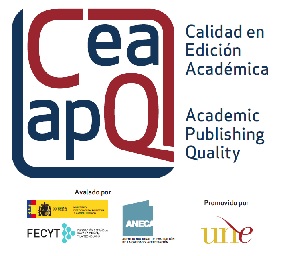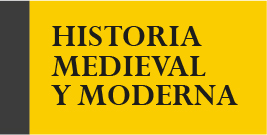Medieval & Modern History Series
1. Series Guidelines
In the Medieval and Modern History Series we publish original research monographs and collective works on Spanish, European or American historical subjects from medieval and modern times. Preferably, it welcomes works that approach, from different methodological perspectives, subjects such as the political and ideological constructions and representations, spaces and forms of power, social history, economic history, history of population, of migratory processes, of groups and of social conflicts, of gender, social networks, religiosity and daily life. The collection is mainly aimed at academics and researchers in the areas of Medieval, Modern and American History, as well as certain titles which may appeal to a broader audience, such as those dealing with the History of the Basque Country.
Works submitted to the Series must be the result of original research and may not have been published previously in any other medium of communication.
The aim of the Series is to publish at least two titles per year. The original texts will undergo a double-blind peer review process.
All titles published to date correspond to the subject matter and editorial policy of the Series. By also including subjects related to the History of America, some titles may exceed the intended temporal scope, especially those referring to the issue of emigration.
2. Start date
1989
3. Director
Alberto Angulo-Morales
Doctor in Geography and History by the University of the Basque Country (Universidad del País Vasco, UPV/EHU) in 1995, and Associate Professor of the Departament of Philology and History also in the University of the Basque Country since 1996.
Member of the Consolidated Group of Research “Basque Country and America: Bonds and Atlantic Links” in the Basque University System, and the “Contractor State Group-Red Imperial” Group of Research of the University of Navarre (Universidad de Navarra) since 2014.
Subjects such as politics, economy, society and culture in the History of the Basque Country between 1450 and 1850 stand out among his areas of research, in particular the Basque diaspora in the Modern Age, the “juntas” or Basque parliaments, its foreing policy, customs and business management, and wars and borders.
Some of his recent publications:
- Angulo-Morales, Alberto, and Óscar Álvarez-Gila (Dirs.) (2016), From the Records of my Deepest Memory: Personal Sources and the Study of European Migration, 18th-20th centuries. Bilbao: Universidad del País Vasco (ISBN: 9788490824016).
- Angulo-Morales, Alberto, and Álvaro Aragón-Ruano (Eds.) (2016), Recuperando el Norte: Empresas, Capitales y Proyectos Atlánticos en la Economía Imperial Hispánica. Bilbao: Universidad del País Vasco (ISBN: 9788490824672).
- Aragón-Ruano, Álvaro, and Alberto Angulo-Morales (Coords.) (2019), Una Década Prodigiosa. Beligerancia y Negociación entre la Corona y las Provincias Vascas (1717-1728). Bilbao: Universidad del País Vasco (ISBN 9788490829080).
- Ofelia Rey-Castelao, and M. Pablo Cowen (Coords.), “Orden y desorden familiar en la emigración. El asociacionismo del norte peninsular (siglos XVII-XVIII).” In Familias en el Viejo y el Nuevo Mundo, 113-133. Buenos Aires: Universidad de La Plata, 2017 (ISBN: 9789503415863).
- Michèle Crogiez, Juan Manuel Ibeas, and Alain Schorderet (Eds.), “Des hommes, des idées et des resources: le projet de la Bascongada et la Congrégation Royale des Trois Provincies de Cantabrie a Madrid (1713-1775).” In Savoir et Civisme. Les Sociétés Savantes et l’Action Patriotique en Europe au XVIII Siècle, 379-388. Genève: Slatkine Erudition, 2017 (ISBN: 9782051028110).
- Miguel Ángel Melón-Jiménez, Miguel Rodríguez-Cancho, Isabel Testón-Núñez, and María Rocio Sánchez-Rubio (Lit. Eds.), “Información, negociación y defensa: las fronteras en las provincias exentas (XVI-XVII).” In Dinámica de las Fronteras en Periodo de Conflictos: el Imperio Español (1640-1815), 153-172. Cáceres: Universidad de Extremadura, 2019 (ISBN 9788491270331).
- "Los frutos de la movilidad, le emigración norteña peninsular y el Imperio (siglos XVII y XVIII)," Obradoiro de Historia Moderna, no. 25 (2015): 1-27 (ISSN: 1133-0481).
- “De casacas azules a blancas. El Regimiento de Infantería de Cantabria (1715-1826),” Tiempos Modernos: Revista Electrónica de Historia Moderna 10, no. 4 (2020): 340-355 (ISSN-e 1699-7778).
So far he has conducted twelve Master’s Theses and five Doctoral Theses.
He is a member of the Academic Comission of the Master Europe and Atlantic World: Power, Culture and Society.
4. Scientific Committee
4.1. Members
The members of the Scientific Committee for the Series work on an individual and altruistic basis. They are designated for five-year periods and may cease at their own request, when they wish to do so. The members are as follows:
- José Antonio Jara Fuente, Professor of Medieval History at the University of Castilla-La Mancha
- Pascual Martínez Sopena, Professor of Medieval History at the University of Valladolid
- Ignacio Fortea Pérez, Professor of Modern History at the University of Cantabria
- François Godicheau, Professor of Contemporary History at the University of Toulouse
- Begoña Alonso Ruiz, Professor of History of Art at the University of Cantabria
- Ofelia Rey Castelao, Professor of Modern History at the University of Santiago de Compostela
- Ana Rodríguez López, Scientific Researcher at the Institute of History - Centre for Human and Social Sciences (CCHS). CSIC
- Ana de Zaballe Beascoechea, Professor of Medieval, Modern and American History at the University of the Basque Country
4.2. Functions
The Scientific Committee for the series is an advisory and consultative body to the Series Director.
Its main function is to advise on how to improve the quality of the series and propose external evaluators. Its members do not carry out the function of external evaluators, except in cases where, given their knowledge on certain subjects, their opinions are essential.
5. Instructions for authors submitting original manuscripts
The author/authors must submit an application to the Editorial Service, duly completed, specifying the following information: personal data, full title of the work, scientific interest, target audience and possible commercial reach of the same. Also a brief curriculum of the author(s).
Works may be written by one or various authors.
Texts presented must be completely finished (indices, body of the text, notes, bibliography, illustrations, etc.).
Originals should be sent with 2 copies in electronic format: one as a PDF and the other in editable format (.DOC), to the Editorial Service e-mail at the University of the Basque Country (argitaletxea.erregistroa@ehu.eus / registro.editorial@ehu.eus). The Editorial Service may request a printed copy of the work if it considers it necessary.
The text should be written in Times New Roman, font size 12 for text, and size 10 for notes.
Images, figures and illustrations accompanying the text must be of good quality and in one of the following formats: ".jpg", ".pdf", ".eps", ".tif", ".ai", ".psd", ".hmp", and of high resolution. They should be sent on CD or other labelled media, indicating the title and programmes used.
In all cases, the original must conform to the standards set out in Annex I to the Manual de Publicaciones del Servicio Editorial de la Universidad del País Vasco. (UPV/EHU Editorial Service Publications' Handbook).
6. Information on the manuscript selection process
The process for presentation and evaluation of originals will be governed by the principles of rigour, transparency and guarantee of anonymity of the evaluation, and will be carried out by means of the procedure of double-blind peer evaluation.
The evaluation process will proceed as follows:
- The Editorial Service Managers will carry out the initial analysis regarding the suitability of the work, after consulting with the Editorial Board Commission for the field of study to which the work belongs, and the Series Director.
- If the response is affirmative, the Editorial Service Managers and the Series Director will select four people as external evaluators from the specialists in the subject matter: two referees and two backup referees. The Editorial Service will request the reviewers to submit their report within a period not exceeding sixty days after the original work has been sent. Upon acceptance of the reviewers, the contacts established between them and the Editorial Service will be made via e-mail.
- On reviewing the external evaluation reports, the relevant Commission and the Series Director, will decide whether or not to accept the publication:
- The issuance of two favourable reports would recommend the publication of the work, which may be subject to modifications based on the suggestions and recommendations contained in the external evaluation reports.
- The issuance of two unfavourable reports would advise against publication of the work.
- In the event of a conflict between one favourable and one unfavourable evaluation, a third report may be requested.
Once the evaluation process has been completed, the Series Editors will communicate by e-mail to the author, in the light of the aforementioned evaluations, the decision whether or not to accept the manuscript and, if accepted, any proposed corrections.
Should the work require corrections, these would be forwarded by e-mail to the Editorial Service Managers within a period of no more than 30 days from the date of receipt of notification of corrections. The author(s) will resend the revised manuscript, with the corrections clearly made and indicated.


